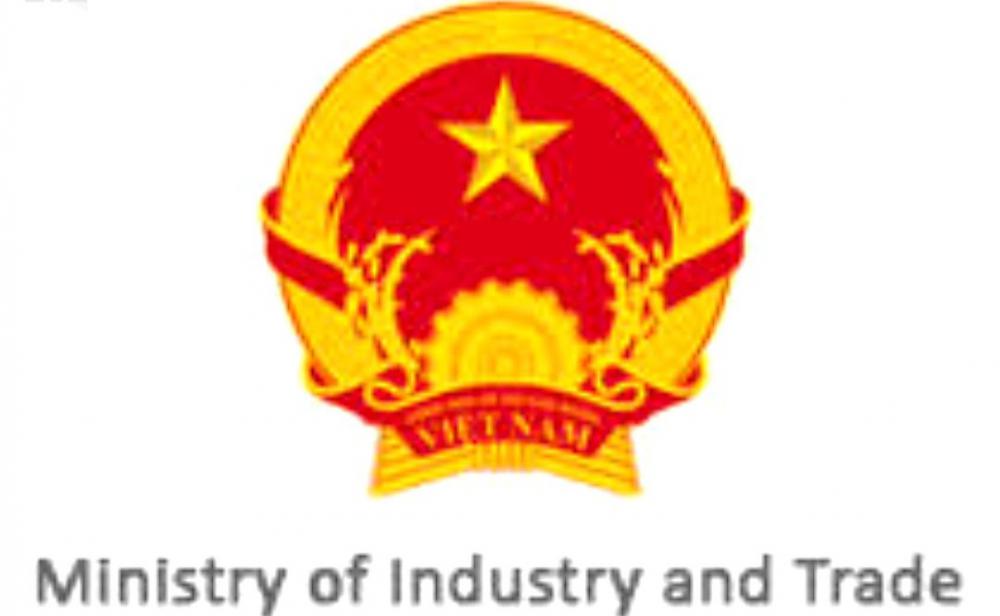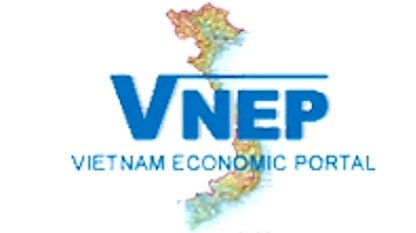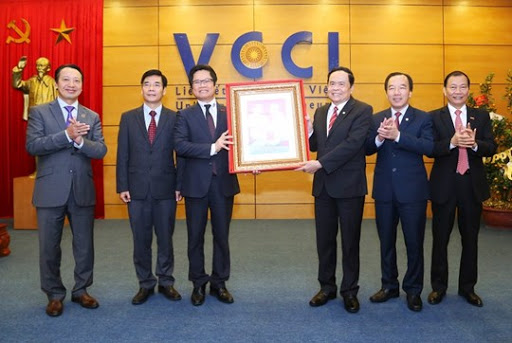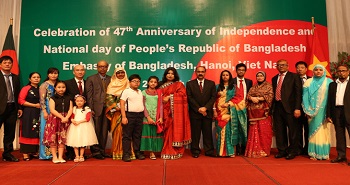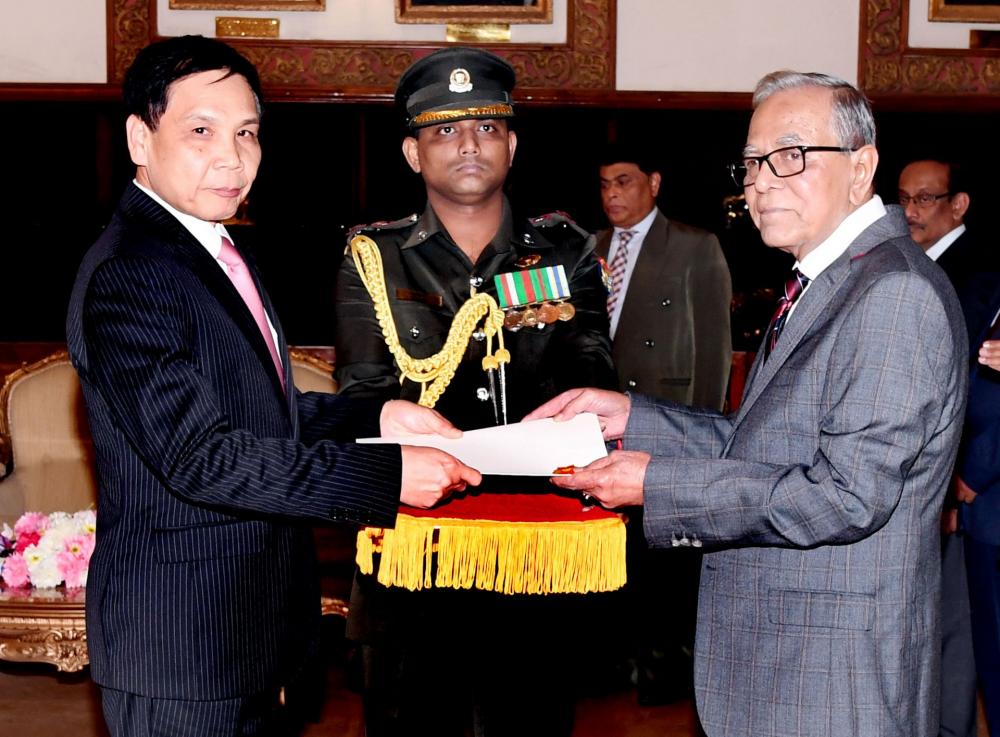-
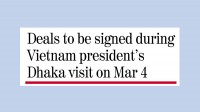
Bangladesh targets $1b trade ties with Vietnam
-

VIETNAM COFFEE EXPORTS UNDER THE TOP 2 OF THE WORLD
-

Rice Exports by Country
-
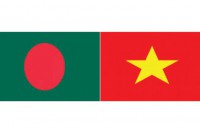
Relations between Bangladesh and Vietnam
-
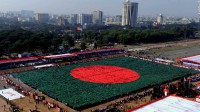
Bangladesh Economic Outlook 2019: A resilient economy in need of sound policy LIGHTCASTLE ANALYTICS WING
-

Bangladesh Economy Continues Robust Growth with Rising Exports and Remittances
-

Vietnam beats us in RMG for last 5 months in 2019
-
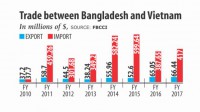
Bangladesh to seek more Vietnamese investment
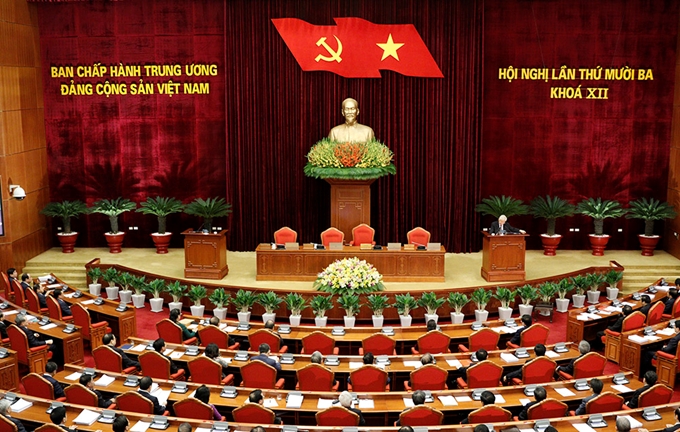
The politics of Vietnam are defined by a single-party socialist republic framework, where the General Secretary of the Communist Party of Vietnam is the Party leader and head of the Politburo, holding the highest position in the one-party system. The President of Vietnam is the head of state, and the Prime Minister of Vietnam is the head of government in a one-party system led by the Communist Party of Vietnam.[1] Executive power is exercised by the government and the President of Vietnam. Legislative power is vested in the National Assembly of Vietnam (Vietnamese: Quốc hội Việt Nam). The Judiciary is independent of the executive. The parliament adopted the current Constitution of Vietnam, its fifth, on 28 November 2013.
The President (Chủ tịch nước) is elected by National Assembly for a five-year term and acts as the commander-in-chief of the Vietnam People's Armed Forces and Chairman of the Council for Defence and Security. Moreover, the president has the right to decide on executive brands. The government (Chính phủ), the main executive state power of Vietnam, is headed by the Prime Minister, who has several Deputy Prime Ministers and several ministers in charge of particular activities. The executive branch is responsible for the implementation of political, economic, cultural, social, national defence, security and external activities of the state. The National Assembly is a unicameral legislative body. The National Assembly has 500 members, elected by popular vote to serve four-year terms. The legislature is, according to the constitution, the highest organ of the state. Its powers includes the enactment and amendment of the constitution and laws; the adoption of the government budget; supervising the Government of Vietnam and other holders of public powers responsible to the National Assembly; and appointing members of the judiciary. The Vietnamese constitution and legislation provide for regular elections for the office of the President of the Socialist Republic, the National Assembly and the People's Councils.
Vietnam has a judicial system governed by the Constitution of Vietnam and national legislation enacted by National Assembly. The Supreme People's Court (Tòa án Nhân dân Tối cao) is the highest court of appeal in Vietnam. There are other specialised courts in Vietnam, including the Central Military Court, the Criminal Court, the Civil Court and the Appeal Court. The Supreme People's Procuracy observes the implementation of state organs and makes sure that Vietnamese citizens follow the law.
.jpg)
CONSTITUTION
The current Constitution was adopted by the 13th National Assembly in 2013. The 2013 Constitution is the fundamental legal document of highest legal jurisdiction that institutionalizes basic viewpoints of the Communist Party of Viet Nam on economic and political reforms, socialist goals, socialist democracy and citizens’ freedom rights. The Constitution clearly indicates that the state power is in the hand of the people. The State is of the people, by the people and for the people. The State ensures and constantly promotes the people’s right to mastery in all fields and implements the policy of equality, unity and mutual assistance among ethnic groups. The people use the state power through the National Assembly and people’s councils. These agencies are elected by the people, representing their will and aspiration.
The Constitution endows all citizens (men or women alike) with equal rights in all political, economic, cultural and social areas as well as in family affairs, the right to freedom of belief and religion, the right to follow or not to follow any religion, the right to freedom of movement and residence within Viet Nam, the right to go abroad and return home as stipulated by laws, etc.
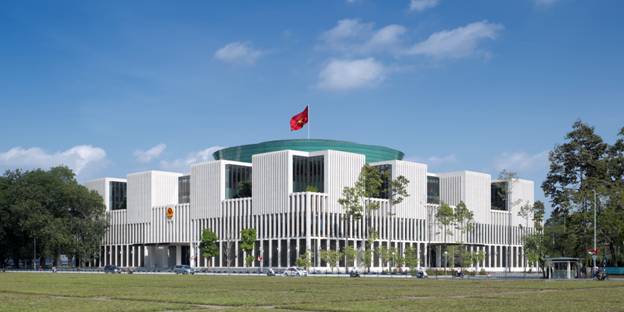
POLITICAL SYSTEM
The Socialist Republic of Viet Nam is a law-governed state. The political system was established upon the birth of the Democratic Republic of Viet Nam and comprises the following:
The Communist Party of Viet Nam is the vanguard of the Vietnamese working class, the working people, and the whole nation; a loyal representative of the interests of the working class, the working people, and the whole nation.
People in the political system: As the maker of history, the people constitute the decisive force in the process of social evolution and make up the current political system in Viet Nam. All powers belong to the people and their powers are exercised through the State. The State regulates the society by laws under the leadership of the Communist Party of Viet Nam.
The State of the Socialist Republic of Viet Nam is the central organization and the pillar of the political system that realizes the will and power of the people, acts on behalf of the people and is accountable to the people for the management of all activities of the social life and in domestic and external affairs.
The National Assembly is the highest-level representative body of the people; the highest organ of state power of the Socialist Republic of Viet Nam; the National Assembly exercises three main functions: to legislate, to decide on important national issues, to exercise supreme supervision over all activities of the State.
The State President is the Head of State, elected by the National Assembly from among its deputies to represent the Socialist Republic of Viet Nam in domestic and foreign affairs. The President has twelve powers as provided by the Constitution, of which the most important are to declare the promulgation of the Constitution, laws and ordinances, to head the all people’s armed forces and assume the Chairmanship of the National Defence and Security Council, to recommend to the National Assembly the election, removal or dismissal of the Vice President, the Prime Minister, Chief Justice of the Supreme People's Court, and Head of the People's Procuracy.
The Government is the highest body of State administration of the Socialist Republic of Viet Nam. The Government has the same term of office as the National Assembly. The Government administers the implementation of the State’s affairs in the fields of politics, economics, culture, society, national defense and security and foreign relations; ensures the efficiency of the State apparatus from central to grassroots levels; assures that the Constitution and laws are respected and executed; and guarantees the sustainability and improvement of the people’s material and spiritual life. The Government consists of Prime Minister, who is a National Assembly deputy as provided by the Constitution, Deputy Prime Ministers, Ministers and other members.
People's Courts: The Supreme People's Court, local People's Courts, Military Tribunals and the other tribunals established by law are the judicial organs of the Socialist Republic of Viet Nam. Under special circumstances, the National Assembly may decide to set up a Special Tribunal. During trials, the Jury is equal to and independent from judges and shall only obey the law. Trials are held publicly except in cases stipulated by laws. Judgments of the People's Courts are made collectively and decided by majority. The Supreme People's Court is the highest judicial organ of the Socialist Republic of Viet Nam. It supervises and directs the judicial work of local People's Courts, Military Tribunals, Special Tribunals and other tribunals, unless otherwise prescribed by the National Assembly at the establishment of such Tribunals
People's Procuracies: The Supreme People's Procuracy oversees the enforcement of the law by Ministries, Ministerial–level organs, other Government agencies, local administration, economic entities, mass organizations, people's military organs and citizens. It exercises the right to prosecution, ensures serious and uniform implementation of the law. Local People's Procuracy and Military Procuracy oversee the execution of the law and exercise the right to prosecution as stipulated by the law.
Social-Political Organizations and People’s Associations: These are organizations representing the interests of different social communities participating into the political system with their own principles, purposes, and features. There are currently major social-political organizations in Viet Nam such as the Vietnamese Fatherland Front, Vietnamese Trade Union, Vietnamese Women’s Union, Ho Chi Minh Communist Youth Union, and Veterans Association and other professional organizations.
Copyrights Thiet Ke Website by ungdungviet.vn

